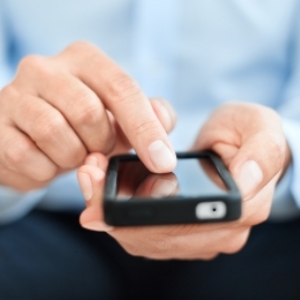
Plenty of people are eager to use their mobile phones and tablet computers to better manage their health care, a new poll finds - though the nation has a way to go before we're all consulting Dr Smartphone.
In a Harris Interactive/HealthDay survey released Tuesday, more than one-third of respondents who are online said they were "very" or "extremely" interested in using smartphones or tablets to ask their doctors questions, make appointments or get medical test results.
Similar numbers of respondents were eager to use mobile phones and tablets for actual health-care services -- such as monitoring blood pressure or blood sugar, or even getting a diagnosis. Such phone and tablet apps are, however, either just getting off the ground or not yet on the market.
The survey results show that the demand for digital assists to health care is "strong and likely to grow," said Humphrey Taylor, chairman of The Harris Poll. But he added that big questions remain: What types of services will consumers be able to get with their mobile devices, and when?
"The devil will surely be in the details," Taylor said, "and these are very big details."
What's in the immediate future
An expert in health-care information agreed. "Right now, we're looking at a patchwork system," said Titus Schleyer, who heads the Center for Biomedical Informatics at the Regenstrief Institute, based at Indiana University-Purdue University in Indianapolis.
Companies are developing a number of apps that, along with equipment attached to your phone or tablet, can help diagnose everything from ear infections and eye diseases to irregular heartbeats and malaria. One goal is to bring better health care to remote parts of the world.
But there are already apps out there designed for the masses -- including ones to manage your blood pressure or blood sugar readings, for example. You take the reading via a monitor that plugs into your smartphone, and the app records all the information, which can then be e-mailed to your doctor or sent to your electronic health record, Schleyer said.
Of course, your doctor has to have the systems in place to do something with that information. And, Schleyer added, depending on where you live, and what health system you're in, that may or may not be the reality.
How smartphones are already affecting healthcare
Schleyer said he has first-hand experience with the obstacles. His wife found an app that let her record and organise her blood pressure readings, only to discover that her smartphone "couldn't talk" to their health-care system's portal.
She ended up just bringing her smartphone to her doctor's visit.
"This poll shows us that the public is interested in using these apps," Schleyer said. "But the health-care system has to make it easier for them to do it."
Taylor said that in some other countries, services like these are more widely used because they are required or doctors are compensated to employ them. "But in this country," he said, "most doctors and hospitals have little or no incentives to provide them. They are unlikely to offer them until it is in their interest to do so."
Another poll finding was that, not surprisingly, younger adults are more eager to use their smartphones and tablets than older adults. Only one-quarter of people aged 65 and older were very interested in using the devices to help manage their blood pressure, for instance -- compared to 38 percent of younger people.
On one hand, Schleyer noted, older adults could stand to benefit the most from such technology, because they're more likely to have chronic health conditions and need more contact with their doctors.
On the other hand, they may simply not be as comfortable with smartphones and tablets as younger generations are, he said.
Despite the interest in tapping into smartphones and tablets for health care, some poll respondents had some misgivings. They were less inclined to want e-mail or text "reminders" to exercise, quit smoking, or take medication, for example.
Schleyer said that may be because it's a bit like having your mom nag you electronically. Plus, many Americans are already inundated with e-mails and texts. "People may feel there's already too much digital information flying at them," he said.
Poll respondents were also worried about the security of their electronically transmitted medical information: 47 percent were "somewhat confident" it would be secure, while roughly 40 percent were "not very" or "not at all" confident.
That's a valid worry, Schleyer said. However, he also doubts that a hacker would have much interest in the blood pressure readings you're sending to your doctor. "They're probably more interested in your credit card number."
Schleyer thinks there's a lot of promise for technology to improve health care for Americans -- if, for instance, consumers can get not only test results sent to their phones, but also user-friendly information on what those results mean.
"But right now, none of this is mature yet," he said.
The poll results are based on an online survey of 2 050 Americans aged 18 and older, conducted between May 22-24.
More information
The U.S. Department of Health and Human Services has more on health information technology.




 Publications
Publications
 Partners
Partners














